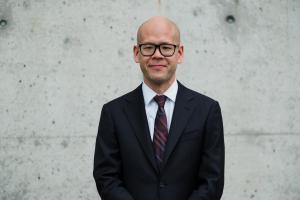
Associate Professor Hoi Kong (inaugural Rt. Hon. Beverley McLachlin, P.C., UBC Professor in Constitutional Law) joined the faculty in 2018.
With an ambitious and wide-ranging research agenda and numerous publications, grants and projects to his name, Professor Hoi Kong is taking his place as one of Canada’s foremost scholars in constitutional law, across its full range of complexity. But take a quick glance at Professor Kong’s CV and it becomes clear that he is also passionate about teaching. In recognition of his outstanding contributions to both teaching and research in law, the Canadian Association of Law Teachers presented him with its award for academic excellence, and over the years, Professor Kong has received other accolades for his teaching, including McGill University’s Principal’s Prize for Excellence in Teaching, and teaching awards from the Queen’s University Law Students’ Society and the McGill Law Students’ Association.
When it comes to his approach to pedagogy, Professor Kong emphasizes the importance of students playing an active role in their learning.
“My teaching aims to facilitate students’ engagement with the materials and with each other. I am always impressed by the depth and creativity of insights that result from conversations in which students are sincerely committed to the project of learning. And I try to engage students in discussions about what and how they’re learning because it’s important for me to understand what they’re experiencing so that my teaching can be responsive to them.”
Outside the classroom, Professor Kong’s scholarly work is no less collaborative—clearly evident in his research and contributions across disciplines.
Professor Kong co-directs, with Professor Ron Levy from the Australian National University, the Project on Deliberative Governance and Law. He is also on the board of directors of the Centre for Interdisciplinary Research on Montreal and on the executive editorial board of the American Journal of Comparative Law.
“I think in general, collaborating across disciplines can help shed light on the kinds of topics that I’m interested in. For example, the urban planners and architects I’ve worked with have extensive on-the-ground experience with participatory processes, and I’ve learned a huge amount about institutional design from collaborating with them. And exchanges I’ve had with political theorists and political scientists have helped me better to identify who gets excluded from legal and political processes, and to understand more clearly the normative significance of inclusion. These interdisciplinary collaborations have helped me to propose institutional reforms that aim to facilitate inclusion and that are sensitive to the contexts in which exclusion arises.”
Professor Kong’s experiences have spanned the globe. He received his LLB and BCL from McGill University’s Faculty of Law and his LLM and JSD from Columbia Law School. He’s also conducted research as a visiting scholar at Kyoto University, the Australian National University, and the University of Fribourg.
“In my experience, intercultural and international collaboration can challenge one’s assumptions about law and legal institutions. As a consequence, working across legal and national cultures can help clarify one’s understanding of law and its significance, and can lead to novel responses to seemingly intractable problems. “
Now having landed in Vancouver, Professor Kong is looking forward to getting to know this city.
“I am constantly marveling at the beauty of this place and am appreciative of the kindness shown to me by the people I’ve met since I’ve arrived. I should add that I am on the hunt for the perfect bowl of ramen and am open to recommendations.”
Professor Kong’s research interests mostly lie in Administrative, Comparative and Constitutional Law and Regulatory Design and Governance.
First published on October 11, 2018.